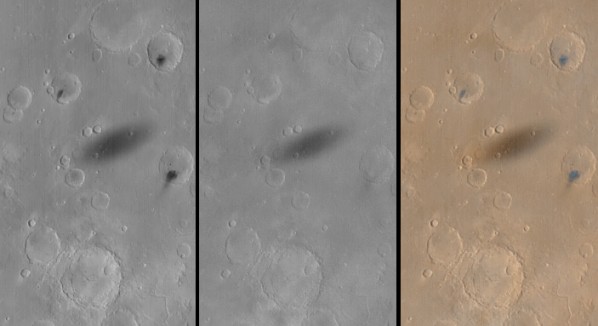Explanation: Hurtling through space above the Red Planet, potato-shaped Phobos completes an orbit of Mars in less than eight hours. In fact, since its orbital period is shorter than the planet's rotation period, Mars-based observers see Phobos rise in the west and set in the east - traveling from horizon to horizon in about 5 1/2 hours. These three images from the Mars Global Surveyor (MGS) spacecraft record the oval shadow of Phobos racing over western Xanthe Terra on August 26, 1999. The area imaged is about 250 kilometers across and is seen in panels from left to right as red filter, blue filter, and combined color composite views from the MGS wide-angle camera system. The three dark spots most easily seen in the red filter image are likely small fields of dark sand dunes on crater floors. Standing in the shadow of Phobos, you would see the Martian version of a solar eclipse!
1999 2000 2001 2002 2003 2004 2005 2006 2007 2008 2009 2010 2011 2012 2013 2014 2015 2016 2017 2018 2019 2020 2021 2022 2023 2024 2025 |
Январь Февраль Март Апрель Май Июнь Июль Август Сентябрь Октябрь Ноябрь Декабрь |
NASA Web Site Statements, Warnings, and Disclaimers
NASA Official: Jay Norris. Specific rights apply.
A service of: LHEA at NASA / GSFC
& Michigan Tech. U.
|
Публикации с ключевыми словами:
Phobos - Mars - Martian moon - eclipse - Фобос - Марс - затмение
Публикации со словами: Phobos - Mars - Martian moon - eclipse - Фобос - Марс - затмение | |
См. также:
Все публикации на ту же тему >> | |
